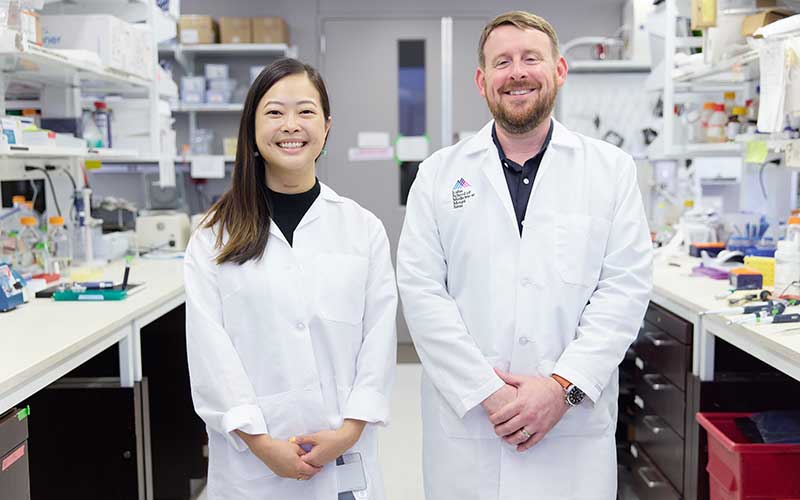In Donning New White Coats, Students Take on a New Chapter
The excitement in the Alice Tully Hall at the Lincoln Center for Performing Arts was palpable as families and friends waited for their loved ones to receive their coats in the White Coat Ceremony on Tuesday, September 13, as part of their journey at the Icahn School of Medicine at Mount Sinai. Meanwhile, outside the hall, medical student Mateo Restrepo was feeling nervous.
“It’s been challenging getting to this point,” he said, “but this is a moment me and all my classmates have been waiting for a long time.”
In his address, Dennis Charney, MD, Anne and Joel Ehrenkranz Dean of Icahn Mount Sinai, posed challenges to the 120 students who make up the class of 2026.
“But, now, as first-year students embarking on a career in medicine, the white coat you are about to receive represents a new tabula rasa,” Dr. Charney said. “How will you paint that blank canvas? What will you contribute to the field of medicine? How will you relieve suffering?”
Medical trainees then stepped up to the stage to receive their short white coats—a symbol of their journey to becoming fully fledged physicians with long white coats. As a faculty member robed each student, their stories about why they chose to enter health care were shown on a screen, spanning personal encounters with the health profession, heartfelt struggles with disease by family or themselves, and inspiration to challenge boundaries of health and science.
Meet: Mateo Restrepo, Class of 2026
Born in Colombia, Mr. Restrepo moved to Canada when he was five years old and was a professional soccer player. He then left his soccer career to pursue a medical education after graduating from the University of California, Santa Barbara.
What drew you to Icahn Mount Sinai?
Mount Sinai is uniquely situated to help underserved communities. Its presence in East Harlem especially means there are communities there that speak to my Latin [American] roots, and I look forward to seeing where I can help and learn from them.
What medical fields do you envision entering?
My sports background naturally makes me inclined toward orthopedic surgery, but I’m keeping an open mind.
What challenges might you anticipate in your medical journey?
One challenge that comes to mind is something I’ve already encountered: the need to take time to reconnect with myself during stressful times. I’ve learned more about myself during my time here and how I am able to deal with future challenges.
Meet: Katrina Nietsch, Class of 2026
Ms. Nietsch is one of three students who joined the Icahn School of Medicine at Mount Sinai through the school’s Institutional Partnership with the U.S. military. She was a pilot in the U.S. Navy and was accepted into the school in 2019.
What drew you to the Icahn School of Medicine at Mount Sinai?
I was drawn to the school’s commitment to underprivileged communities, which is second-to-none, and its commitment to veterans’ health. Just walking around campus and seeing the humility, expertise, and resourcefulness of the faculty and students is inspiring.
What medical fields do you envision entering?
I am thinking about a career in orthopedic surgery and sports medicine, but I am also looking at other possibilities, including women’s health.
What challenges might you anticipate in your medical journey?
I took the winding route since I served for 11 years in the military before finishing my commitment to the Navy and coming to medical school. It was time-consuming balancing a full-time career and preparing for medical school, so I am so grateful to be here now. As an older student, it has been a while since I was an undergraduate college-student, but I’m confident that with my intellectual curiosity and my military training, I will be able to tackle any challenges head on.
“Your white coats will never be cleaner or whiter than they are today,” remarked Victor Sta. Ana, MD, Director for Mount Sinai’s Primary Care Scholars Program, and Assistant Professor of Family Medicine and Community Health at Icahn Mount Sinai, in his keynote speech. He noted that the students’ journeys will only get more challenging. He described the isolation and grief he and his colleagues experienced during the height of the pandemic, and urged upon the incoming students a commitment to compassion and equity.
“I feel humbled and grateful for the opportunity to wear the white coat. I am also acutely aware of the responsibility which comes with wearing it,” said Katrina Nietsch. ”But I’m sure with the support of the faculty and my fellow peers, I’ll be up to the task to learn and find ways to get better as a provider.”
Here’s what some medical students had to say about what receiving their white coats meant to them:




























